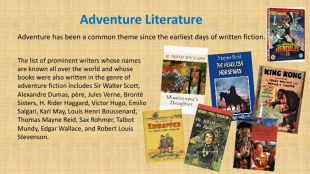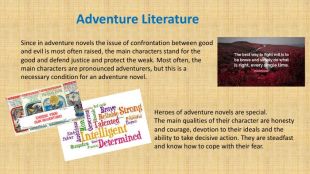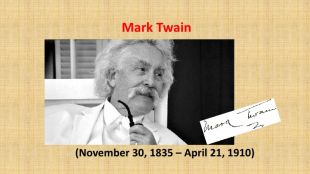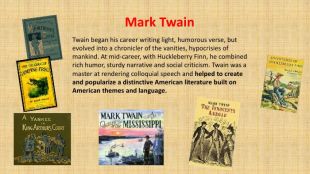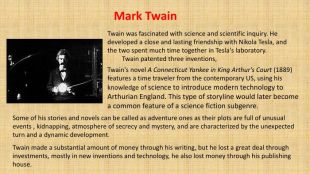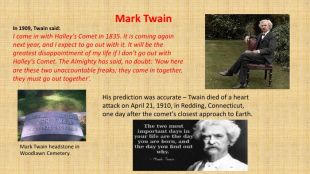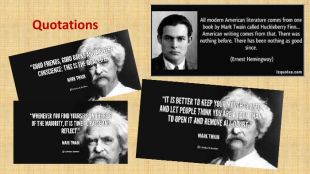Пригодницька література. Марк Твен (Презентація)



















Eleanor Roosevelt“The purpose of life is to live it, to taste experience to the utmost, to reach out eagerly and without fear for newer and richer experience.”«Мета життя полягає в тому, щоб прожити його, і у повній мірі відчути на смак набутий досвід, і з нетерпінням, і без страху прагнути відправитися в дорогу за новим та ще більш багатим досвідом».
“.. An adventure is an event or series of events that happens outside the course of the protagonist's ordinary life, usually accompanied by danger, often by physical action. Adventure stories almost always move quickly, and the pace of the plot is at least as important as characterization, setting, and other elements of creative work.”Adventure Literature. In the Introduction to the Encyclopedia of Adventure Fiction, Critic Don D'Ammassa defines the genre as follows:
Adventure Literature. From the mid-19th century onwards, when mass literacy grew, adventure became a popular subgenre of fiction. Although not exploited to its fullest, adventure has seen many changes over the years – from being constrained to stories of knights in armor to stories of high-tech espionage. Adventure fiction often overlaps with other genres, notably war novels, crime novels, sea stories, Robinsonades, spy stories (as in the works of Ian Fleming), science fiction, fantasy.
Adventure Literature. Adventure has been a common theme since the earliest days of written fiction. The list of prominent writers whose names are known all over the world and whose books were also written in the genre of adventure fiction includes Sir Walter Scott, Alexandre Dumas, père, Jules Verne, Brontë Sisters, H. Rider Haggard, Victor Hugo, Emilio Salgari, Karl May, Louis Henri Boussenard, Thomas Mayne Reid, Sax Rohmer, Talbot Mundy, Edgar Wallace, and Robert Louis Stevenson.
Adventure novels and short stories were popular subjects for American pulp magazines, which dominated American popular fiction between the Progressive Era (late 1890s – late 1910s) and the 1950s. Adventure Literature. R. Kipling's "Jungle Book", which was written in 1894-1895, is considered one of the first adventure novels. Other writers began to use elements of adventure literature in their works of a different genre. Pulp magazines (also referred to as "the pulps") were inexpensive fiction magazines that were published from 1896 to the late 1950s. The term "pulp" derives from the cheap wood pulp paper on which the magazines were printed.
Adventure Literature depiction of numerous adventures of the characters;the rapid development of the plot and the combination of several plot lines;motives of trial, persecution, unraveling:characters' characters are presented in development, they change as a result of experienced adventures;Signs of an adventure novel:the presence of numerous secrets, riddles, strange circumstances;the place of action is the world of distant countries, exotic nature, elements, etc.;a combination of different types of narration (on behalf of the author and characters, descriptions, dialogues, monologues, etc.).
Adventure Literature. Heroes of adventure novels are special. The main qualities of their character are honesty and courage, devotion to their ideals and the ability to take decisive action. They are steadfast and know how to cope with their fear. Since in adventure novels the issue of confrontation between good and evil is most often raised, the main characters stand for the good and defend justice and protect the weak. Most often, the main characters are pronounced adventurers, but this is a necessary condition for an adventure novel.
Samuel Langhorne Clemens (November 30, 1835 – April 21, 1910) better known by his pen name Mark Twain,Mark Twain. Samuel Langhorne Clemens was born in Florida. When he was four, Twain's family moved to Hannibal, Missouri, a port town on the Mississippi River that inspired the fictional town of St. Petersburg in The Adventures of Tom Sawyer and Adventures of Huckleberry Finn. Slavery, then legal in Missouri, was a theme Twain would explore in these writings. In 1847, when Twain was 11, his father, by then an attorney and judge, died of pneumonia. The next year Twain left school after the fifth grade to become a printer's apprentice. In 1851, he began working as a typesetter and contributor of articles and humorous sketches for ta newspaper the Hannibal Journal.
Twain studied the Mississippi, learning its landmarks, how to navigate its currents effectively, and how to "read the river" Piloting gave him his pen name, Mark Twain, from "mark twain", the leadsman's cry for a measured river depth of two fathoms (12 feet), which was safe water for a steamboat. Mark Twain. Twain continued to work on the river and was a river pilot until the American Civil War broke out in 1861. In 1868 Twain met Olivia Langdon. In February 1870 Twain and Langdon were married in New York, where he courted her and managed to overcome her father's initial reluctance. She came from a "wealthy but liberal family", and through her, he met abolitionists, "socialists, principled atheists and activists for women's rights and social equality", including Harriet Beecher Stowe (his next-door neighbor in Hartford, Connecticut)
Twain began his career writing light, humorous verse, but evolved into a chronicler of the vanities, hypocrisies of mankind. At mid-career, with Huckleberry Finn, he combined rich humor, sturdy narrative and social criticism. Twain was a master at rendering colloquial speech and helped to create and popularize a distinctive American literature built on American themes and language. Mark Twain
Mark Twain. Twain was fascinated with science and scientific inquiry. He developed a close and lasting friendship with Nikola Tesla, and the two spent much time together in Tesla's laboratory. Twain patented three inventions,Twain's novel A Connecticut Yankee in King Arthur's Court (1889) features a time traveler from the contemporary US, using his knowledge of science to introduce modern technology to Arthurian England. This type of storyline would later become a common feature of a science fiction subgenre. Twain made a substantial amount of money through his writing, but he lost a great deal through investments, mostly in new inventions and technology, he also lost money through his publishing house. Some of his stories and novels can be called as adventure ones as their plots are full of unusual events , kidnapping, atmosphere of secrecy and mystery, and are characterized by the unexpected turn and a dynamic development.
In 1909, Twain said: I came in with Halley's Comet in 1835. It is coming again next year, and I expect to go out with it. It will be the greatest disappointment of my life if I don't go out with Halley's Comet. The Almighty has said, no doubt: 'Now here are these two unaccountable freaks; they came in together, they must go out together'. His prediction was accurate – Twain died of a heart attack on April 21, 1910, in Redding, Connecticut, one day after the comet's closest approach to Earth. Mark Twain headstone in Woodlawn Cemetery. Mark Twain
https://www.youtube.com/watch?v=c. Mt. BPa7hps. A&ab_channel=HISTORYMark Twain: Father of American Literature - Fast Facts | Historyhttps://www.youtube.com/watch?v=EIe. Nn. Dee-Ok&ab_channel=Lifeinthe1800s. Mark Twain Colorized 1909: Filmed by Thomas Edison at Stormfield - Enhanced Video
Questions for discussion. Give the definition of adventure fiction. When did adventure literature become a popular subgenre of fiction ? What genres does adventure fiction overlap with?Why are pulp magazines mentioned when talking about adventure fiction?What are the main elements of adventure literature?Why do we say that heroes of adventure novels are special?What do you know about the childhood and the youth of Samuel Langhorne Clemens ? How did Twain’s outlook change after his marriage to Olivia Langdon ? How was Twain’s interest in science reflected in his writing ?


про публікацію авторської розробки
Додати розробку






